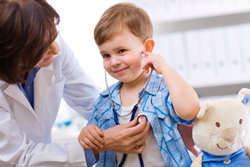Pavilion Publishing and Media Ltd
Blue Sky Offices Shoreham, 25 Cecil Pashley Way, Shoreham-by-Sea, West Sussex, BN43 5FF, UNITED KINGDOM
 GPs are ideally placed to spot early warning signs of child maltreatment and to work with families to prevent them from getting worse, according to a new report.
GPs are ideally placed to spot early warning signs of child maltreatment and to work with families to prevent them from getting worse, according to a new report.
‘The GP’s role in responding to child maltreatment’ claims that giving family doctors the time, support and autonomy to work with vulnerable families in the community could benefit children and families.
The joint report, by the Royal College of General Practitioners (RCGP) and researchers from UCL and the University of Surrey, says that GPs’ skills in building and maintaining a relationship with patients and their families mean they are ideally placed to take more of a leading role in addressing social and emotional issues relevant to health.
Children’s health accounts for a significant part of a GP’s workload and GPs follow strict guidelines and procedures on child safeguarding. But children’s experts say
According to the NSPCC, there is a large gap between cases of child maltreatment in the community and the number of cases receiving attention from children’s social care.
For every child who is subject to a child protection plan, they estimate there are another eight not receiving services, and that this could be even higher.
The report suggests that GPs, as a first and on-going point of contact for parents and their children, are well-placed to work with other front-line professionals to act on concerns about issues such as child neglect and emotional abuse.
This could include providing long-term support and monitoring of children and wider family members, as well as advocating for parents to help them find their way through the health and social care systems and advising and coaching parents about their own health issues, which affect their children, such as alcohol use or mental health problems.
GPs can do this by building relationships with families and using their skills and expertise, as well as those of the wider community health team, such as health visitors.
Drawing on a comprehensive analysis of policy, practice guidance and research evidence, the report calls on governments and policy makers to re-think the role of GPs and maximise the potential of the crucial doctor-parent and doctor-child relationships to create a public health approach of early intervention to reduce child maltreatment.


